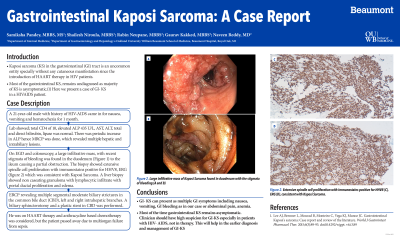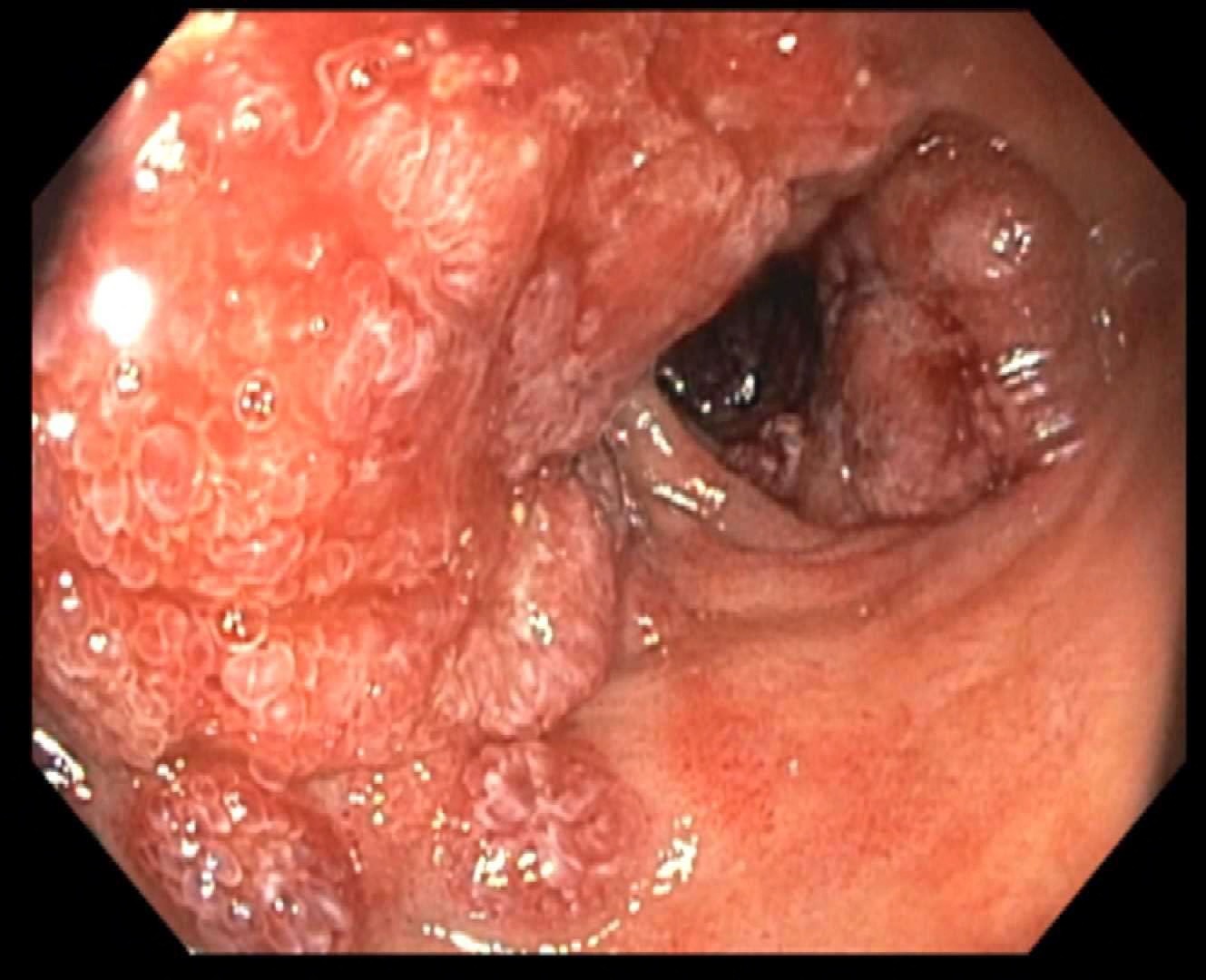Back


Poster Session B - Monday Morning
Category: General Endoscopy
B0303 - Gastrointestinal Kaposi Sarcoma: A Case Report
Monday, October 24, 2022
10:00 AM – 12:00 PM ET
Location: Crown Ballroom

Has Audio

Samiksha Pandey, MBBS
William Beaumont Hospital
Royal Oak, MI
Presenting Author(s)
Samiksha Pandey, MBBS1, Shailesh Niroula, MBBS2, Rabin Neupane, MBBS2, Gaurav Kakked, MBBS2, Naveen Reddy, MBBS2
1William Beaumont Hospital, Royal Oak, MI; 2Beaumont Health, Royal Oak, MI
Introduction: Kaposi sarcoma (KS) in the gastrointestinal (GI) tract is an uncommon entity specially without any cutaneous manifestation since the introduction of HAART therapy in HIV patients. Most of the gastrointestinal KS, remains undiagnosed as majority of KS is asymptomatic. Here we present a case of GI- KS in a HIV-AIDS patient.
Case Description/Methods: A 21-year-old male with history of HIV-AIDS came in for nausea, vomiting and hematochezia for 1 month. Lab showed; total CD4 of 10, elevated ALP 435 U/L, AST, ALT, total and direct bilirubin, lipase was normal. There was periodic increase in ALP hence MRCP was done, which revealed multiple hepatic and intrabiliary lesions. On EGD and colonoscopy, a large infiltrative mass, with recent stigmata of bleeding was found in the duodenum (Figure 1) to the ileum causing a partial obstruction. The biopsy showed extensive spindle cell proliferation with immunostains positive for HHV8 , ERG which was consistent with Kaposi Sarcoma. A liver biopsy was also done which showed non caseating granuloma with lymphocytic infiltrate with portal ductal proliferation and edema. He underwent ERCP revealing multiple segmental moderate biliary strictures in the common bile duct (CBD), left and right intrahepatic branches. A biliary sphincterotomy and a plastic stent in CBD was performed. He was on HAART therapy and anthracycline based chemotherapy was considered, but the patient passed away due to multiorgan failure from sepsis.
Discussion: GI- KS can present as multiple GI symptoms including nausea, vomiting, GI bleeding as in our case or abdominal pain, anemia. (1) However, most of the time gastrointestinal KS remains asymptomatic. (1) Clinician should have high suspicion for GI-KS especially in patients with HIV- AIDS, not in therapy. This will help in the earlier diagnosis and management of GI-KS.

Disclosures:
Samiksha Pandey, MBBS1, Shailesh Niroula, MBBS2, Rabin Neupane, MBBS2, Gaurav Kakked, MBBS2, Naveen Reddy, MBBS2. B0303 - Gastrointestinal Kaposi Sarcoma: A Case Report, ACG 2022 Annual Scientific Meeting Abstracts. Charlotte, NC: American College of Gastroenterology.
1William Beaumont Hospital, Royal Oak, MI; 2Beaumont Health, Royal Oak, MI
Introduction: Kaposi sarcoma (KS) in the gastrointestinal (GI) tract is an uncommon entity specially without any cutaneous manifestation since the introduction of HAART therapy in HIV patients. Most of the gastrointestinal KS, remains undiagnosed as majority of KS is asymptomatic. Here we present a case of GI- KS in a HIV-AIDS patient.
Case Description/Methods: A 21-year-old male with history of HIV-AIDS came in for nausea, vomiting and hematochezia for 1 month. Lab showed; total CD4 of 10, elevated ALP 435 U/L, AST, ALT, total and direct bilirubin, lipase was normal. There was periodic increase in ALP hence MRCP was done, which revealed multiple hepatic and intrabiliary lesions. On EGD and colonoscopy, a large infiltrative mass, with recent stigmata of bleeding was found in the duodenum (Figure 1) to the ileum causing a partial obstruction. The biopsy showed extensive spindle cell proliferation with immunostains positive for HHV8 , ERG which was consistent with Kaposi Sarcoma. A liver biopsy was also done which showed non caseating granuloma with lymphocytic infiltrate with portal ductal proliferation and edema. He underwent ERCP revealing multiple segmental moderate biliary strictures in the common bile duct (CBD), left and right intrahepatic branches. A biliary sphincterotomy and a plastic stent in CBD was performed. He was on HAART therapy and anthracycline based chemotherapy was considered, but the patient passed away due to multiorgan failure from sepsis.
Discussion: GI- KS can present as multiple GI symptoms including nausea, vomiting, GI bleeding as in our case or abdominal pain, anemia. (1) However, most of the time gastrointestinal KS remains asymptomatic. (1) Clinician should have high suspicion for GI-KS especially in patients with HIV- AIDS, not in therapy. This will help in the earlier diagnosis and management of GI-KS.

Figure: Figure 1. Large infiltrative mass of Kaposi Sarcoma found in duodenum.
Disclosures:
Samiksha Pandey indicated no relevant financial relationships.
Shailesh Niroula indicated no relevant financial relationships.
Rabin Neupane indicated no relevant financial relationships.
Gaurav Kakked indicated no relevant financial relationships.
Naveen Reddy indicated no relevant financial relationships.
Samiksha Pandey, MBBS1, Shailesh Niroula, MBBS2, Rabin Neupane, MBBS2, Gaurav Kakked, MBBS2, Naveen Reddy, MBBS2. B0303 - Gastrointestinal Kaposi Sarcoma: A Case Report, ACG 2022 Annual Scientific Meeting Abstracts. Charlotte, NC: American College of Gastroenterology.
